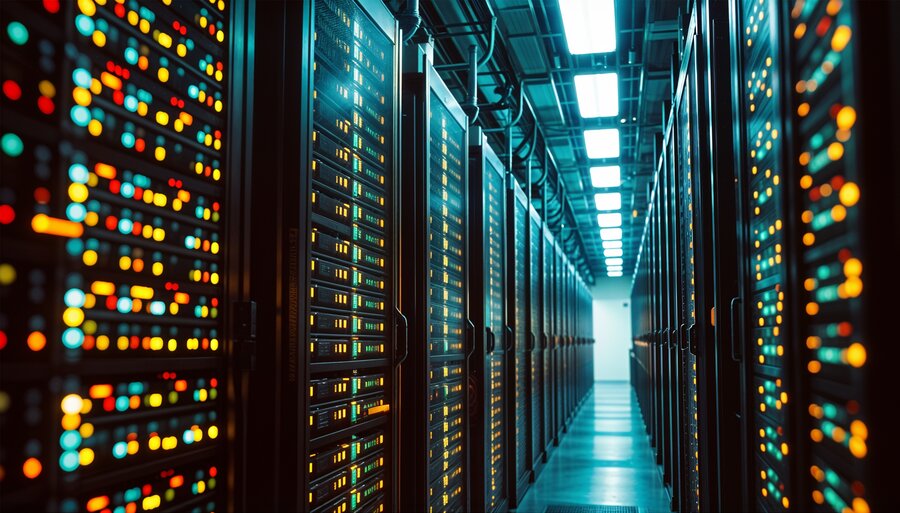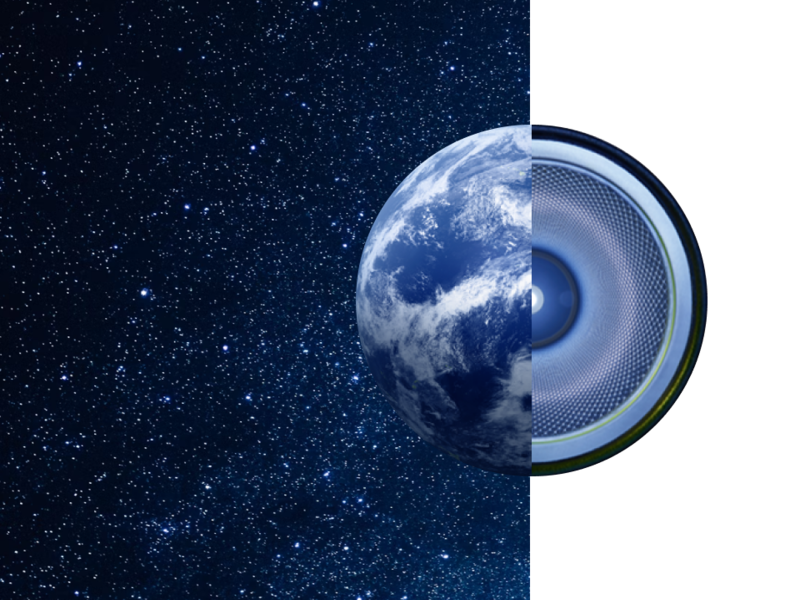Since the end of 2022, artificial intelligence (AI) has been a megatrend that affects the entire industrialized world. Can we work even more efficiently and productively? Can we automate simple decision-making processes? Can we make important decisions much more reliably? AI has what it takes to fundamentally transform our society and economy; the potential is enormous.
And just as enormous as the potential of AI is the energy demand of data centers, which are the backbone of AI applications and cloud computing. These are already among the largest energy consumers worldwide. According to calculations by the consulting firm International Data Corporation (IDC), the global power consumption of data centers will double between 2023 and 2028 with a five-year annual growth rate of 19.5%1.
And electricity is still primarily generated from fossil fuels worldwide. Energy generation accounts for a good quarter of globalCO2 emissions, ahead of transportation, agriculture and industry2. This makes it all the more important to operate energy-intensive applications such as data centers as sustainably as possible - with clean energy as the basis and energy-efficient components such as air filters in operation.
More data centers also lead to more CO2 emissions to generate the energy required. This makes it more difficult for data center operators and their customers to achieve ambitious CO2 emission targets.
Bob Johnson
VP Analyst at Gartner [3]
Why fuel cells are a perfect solution for data centers
Non-fossil energy sources would be an ideal solution for supplying the data centers. Fuel cells, for example, are a flexible and low-emission technology that enable a decentralized energy supply directly on site. They also ensure stable and reliable energy management, which is particularly important for server farms. The systems have a modular design and can therefore be flexibly adapted to the specific energy requirements of the data center.
Fuel cells can be used both as a primary energy source, while the external power grid is used to balance power peaks, and as a back-up system to ensure an uninterrupted power supply in the event of an emergency.
Another benefit: in contrast to classic energy sources such as diesel generators, which causeCO2 emissions, fuel cells convert hydrogen into electrical energy and only release water vapor as a waste product. This technology can therefore significantly reduce the ecological footprint of data centers and thus contribute to air quality and climate protection. They are also quiet in operation and take up little space, which simplifies their integration into existing data centers or new construction projects.

The role of filtration in fuel cell technology
To ensure that fuel cells in data centers can work safely and efficiently, they must be protected from contamination. This is where we come into play as filtration specialists.
Our customized filtration solutions for the fuel cell For example, our filtration solutions are designed to keep the air supply to fuel cells clean and free of particles, which increases their service life and optimizes efficiency. Special filter solutions ensure that harmful particles, moisture and chemical contaminants are removed before they reach the fuel cell. This is because pollutants such as nitrogen oxides (NOx), ammonia (NH3) or sulphur oxide (SO2) can also cause unwanted deposits in the fuel cell and damage it. We have therefore developed our Blue.netic cathode air filter systems to meet all these challenges and ensure the long-term performance of fuel cells.
In addition, ions are introduced into the Coolant during the operation of a fuel cell. These lead to an increase in conductivity and consequently to power losses or electrical short-circuit effects. Hengst's the innovative Ion exchanger Blue.iox offers a particularly high level of protection with minimal maintenance, as it very quickly reduces the ion concentration in the coolant circuit and thus also ensures safe operation of the fuel cell.
As the third product in the field of fuel cell filtration, our Innovative separator module for anode gas recirculation ensures correct water management - a key component in preventing liquid water deposits. Filtration and filtration of pollutants are therefore essential if fuel cells are to be operated safely.
How air filters influence energy requirements in data centers
While fuel cells are another sustainable source of energy for data centers, the energy requirements of a data center's ventilation technology can also be positively influenced by filtration.
Data centers are equipped with air conditioning units that cool down the air heated by the IT technology. This is usually done in recirculation mode with high air exchange rates. The greatest energy requirement here is for the fans that draw in the air. With Differential pressure-optimized and therefore energy-efficient air filters, the systems can be designed in such a way that energy consumption can be reduced. This also reducesCO2 emissions and saves costs for the data center operator at the same time.
A look into the future: working together towards a sustainable AI infrastructure
The future of AI and data centers depends heavily on the energy efficiency and sustainability of the supporting technologies. With our filtration solutions for fuel cells as a clean energy solution and our energy-efficient air filters, we are ready to contribute to the realization of sustainable and high-performance data centers. Filtration thus supports a future in which AI and environmental awareness go hand in hand.
Discover how our filtration solutions enable the safe and efficient use of fuel cells in data centers and how our filters reduce their hunger for energy - and let's create a clean, powerful future together.
Ansprechpartner



Sources
[1]: IDC Report Reveals AI-Driven Growth in Datacenter Energy Consumption, Predicts Surge in Datacenter Facility Spending Amid Rising Electricity Costs, IDC (2024): https://www.idc.com/getdoc.jsp?containerId=prUS52611224
[2]: Emissions Gap Report, Unep (2024): https://www.unep.org/resources/emissions-gap-report-2024
[3]: Gartner Predicts Power Shortages Will Restrict 40% of AI Data Centers By 2027, Gartner (2024): https://www.gartner.com/en/newsroom/press-releases/2024-11-12-gartner-predicts-power-shortages-will-restrict-40-percent-of-ai-data-centers-by-20270

